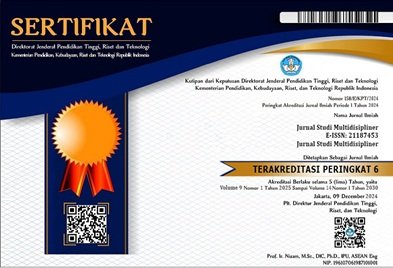ANALISIS PENGARUH GAYA HIDUP HALAL DAN SERTIFIKASI HALAL TERHADAP KEPUTUSAN PEMBELIAN PRODUK MAKANAN: SYSTEMATIC LITERATURE REVIEW
Kata Kunci:
Gaya Hidup Hal, Sertifikasi Halal, Keputusan Pembelian, Produk Makanan, Systematic Literature ReviewAbstrak
Penelitian ini bertujuan untuk menganalisis pengaruh gaya hidup halal dan sertifikasi halal terhadap keputusan pembelian produk makanan melalui pendekatan Systematic Literature Review (SLR). Kajian dilakukan dengan menelaah 30 artikel ilmiah yang diterbitkan antara tahun 2020 hingga 2024, yang diperoleh dari basis data Google Scholar. Hasil analisis menunjukkan bahwa gaya hidup halal berkontribusi dalam membentuk pola konsumsi konsumen Muslim yang berorientasi pada nilai-nilai kehalalan, etika, dan keberlanjutan. Sementara itu, sertifikasi halal berperan sebagai alat validasi yang meningkatkan kepercayaan konsumen terhadap produk makanan. Meskipun mayoritas studi mendukung adanya hubungan positif antara kedua variabel tersebut dengan keputusan pembelian, terdapat pula perbedaan hasil yang dipengaruhi oleh faktor kontekstual seperti lokasi geografis, usia, serta pendekatan metodologis. Temuan ini memberikan implikasi praktis bagi pelaku industri makanan halal dalam merancang strategi pemasaran berbasis nilai dan kepercayaan, serta mendorong regulator untuk meningkatkan literasi dan akses terhadap sertifikasi halal. Secara teoretis, penelitian ini memperkaya pemahaman tentang perilaku konsumen Muslim dan pentingnya pendekatan integratif dalam studi konsumsi halal.
This study aims to analyze the influence of halal lifestyle and halal certification on food product purchase decisions through the Systematic Literature Review (SLR) approach. The study was conducted by examining 30 scientific articles published between 2020 and 2024, obtained from the Google Scholar database. The results of the analysis show that the halal lifestyle contributes to shaping Muslim consumer consumption patterns that are oriented towards halal, ethical, and sustainability values. Meanwhile, halal certification acts as a validation tool that increases consumer confidence in food products. Although the majority of studies support a positive relationship between the two variables and purchasing decisions, there are also differences in results influenced by contextual factors such as geographic location, age, and methodological approaches. These findings provide practical implications for halal food industry players in designing value- and trust-based marketing strategies, as well as encouraging regulators to increase literacy and access to halal certification. Theoretically, this study enriches the understanding of Muslim consumer behavior and the importance of an integrative approach in the study of halal consumption.





